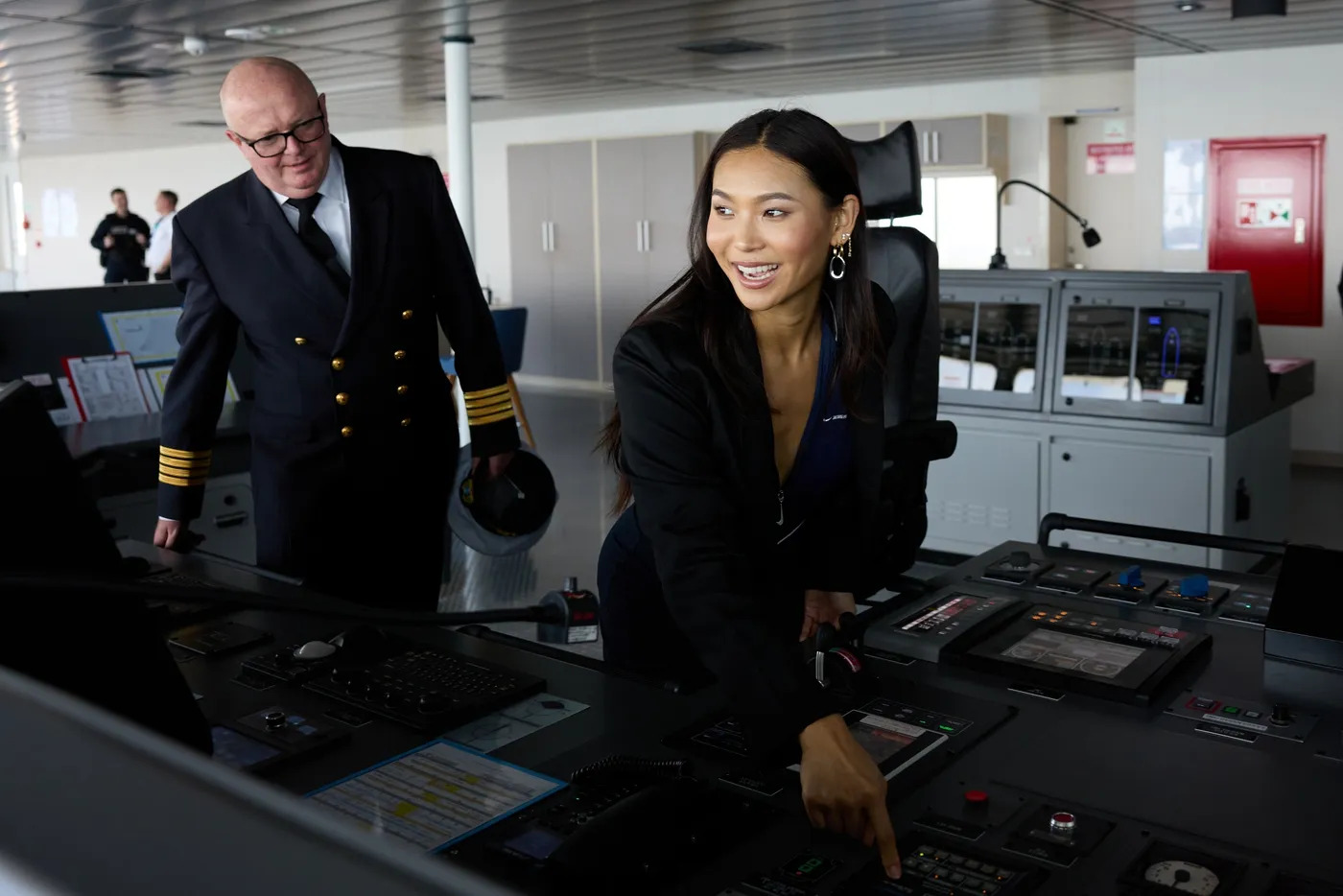US Snowboard Champ Pitches Green Shipping for Maersk
EcoTech Note: Ocean shipping has long been considered “hard to abate,” but here’s the 4th of 12 new container ships from Maersk using sustainable fuels composed of “green methanol.” The Green Premium is about 15% – 20%.
Maersk CEO Vincent Clerc called on the Biden Administration to make the incentives for sustainable trucking and aviation fuels provided by the Inflation Reduction Act available to maritime fuels, too. For now, companies like Amazon, Nike, H&M, Volvo, and Nestle have agreed to pay the premium in order to help meet their own GHG goals.
By Laura Curtis
August 29, 2024
Snowboarder Chloe Kim may not be an obvious patroness of green shipping, and even she’s a bit surprised. But it makes sense: The two-time gold medalist shares her hometown with the busiest port complex in the US. She’s also a climate advocate.
During a naming ceremony hosted by Danish shipping giant Maersk, Kim was made godparent of the first container ship to cross the Pacific from China to the US powered by green methanol.
“I mean, how cool is this, to be the Godmother of a shipping vessel?” the native of Long Beach, California, said Tuesday, right before a champagne bottle smashed against the side of the Alette Maersk. “I kind of love this!”

Kim told the crowd gathered at the Port of Los Angeles she’s frightened by the decreasing snowpack, bigger and more erratic storms, and fewer snow days in the Western US. She highlighted the 11% of greenhouse gases that are released throughout the global supply chain, 3% from ocean-bound trade.
“Climate change could erase my sport. My heart breaks, thinking of future generations who might never get to experience it,” she said.
The 1,148-foot-long Alette Maersk is the fourth in a series of 12 ships powered by methanol and traditional marine fuels. When they’re all in service, the fleet of dual-fuel ships will be able to move around 350,000 20-foot shipping containers using clean methanol, which can be made using agricultural and food waste, dubbed bio-methanol, or in the case of e-methanol, by combining CO2 with hydrogen that’s produced with renewable energy.
Problem is, there’s not enough of it and scaling up is proving to be a challenge. Maersk officials used the occasion to highlight the biggest obstacle to the maritime shipping industry’s carbon-cutting goals: the serious deficit in the global supply of sustainable fuels — and the missing infrastructure that will be required to deliver them.
The shipping industry is asking regulators in the US and Europe to help close the gap between the price of traditional fuels and sustainable ones, which would help to spur more demand and more production.
Read More: California’s Major Ports Deploy Air Pollution Capture for Ships
Maersk CEO Vincent Clerc called on the Biden Administration to make the incentives for sustainable trucking and aviation fuels provided by the Inflation Reduction Act available to maritime fuels, too. He also urged the UN’s International Maritime Organization to adopt emissions standards and pricing mechanisms for maritime fuels that would level the playing field across the industry.
For now, the extra cost of green methanol and other alternative fuels is passed on to customers who opt to pay a surcharge of 15% to 20% per container, said Charles van der Steene, Maersk’s president of North America.
Amazon, Nike
Some big customers with their own decarbonization goals are getting on board. Amazon, Nike, H&M, Volvo and Nestle are among those willing to pay a premium to move cargo using low-emissions fuels, said Saba Takidar, Maersk’s senior commercial sustainability partner.
Last year, Maersk struck a deal with Chinese company Goldwind to supply the 500,000 tons of green methanol that will be needed to run Alette and her 11 sister ships. The wind-powered production project broke ground in Inner Mongolia in April is expected to get up and running in 2026, according to Goldwind.
Given the insufficient supply of sustainable marine fuels, Maersk is staying open minded to other options that may emerge, including bio-fuels and even nuclear power. “There’s not enough in the world for our 700-plus ships,” Takidar said.
Read More: Podesta Heads to Beijing for Round of US-China Climate Talks
Clerc predicted a scalable solution on ammonia will emerge within two years, as engine manufacturers test new ships with redesigned tanks, temperature and safety requirements.
For the time being, though, the Alette will head back to Asia with a lot of help from conventional marine fuel. It took about 2,000 tons of green methanol — which isn’t available in Los Angeles — to make the 12-day voyage from Xiamen. About half that is left in the tanks.
“In the best ideal scenario, it’ll be available in every port in the world, and then we can run these ships everywhere — someday,” Takidar said.
Related Reading:
- Taming Shipping’s One Billion Tons of CO2 Emissions: QuickTake
- Shipping Regulator Falls Short of 1.5C-Aligned Climate Goals
- A Fleet of New Cargo Ships Is Coming. Here’s How They’re Named
—Laura Curtis in Los Angeles
Click here for more of Bloomberg.com’s most-read stories about trade, supply chains and shipping.

